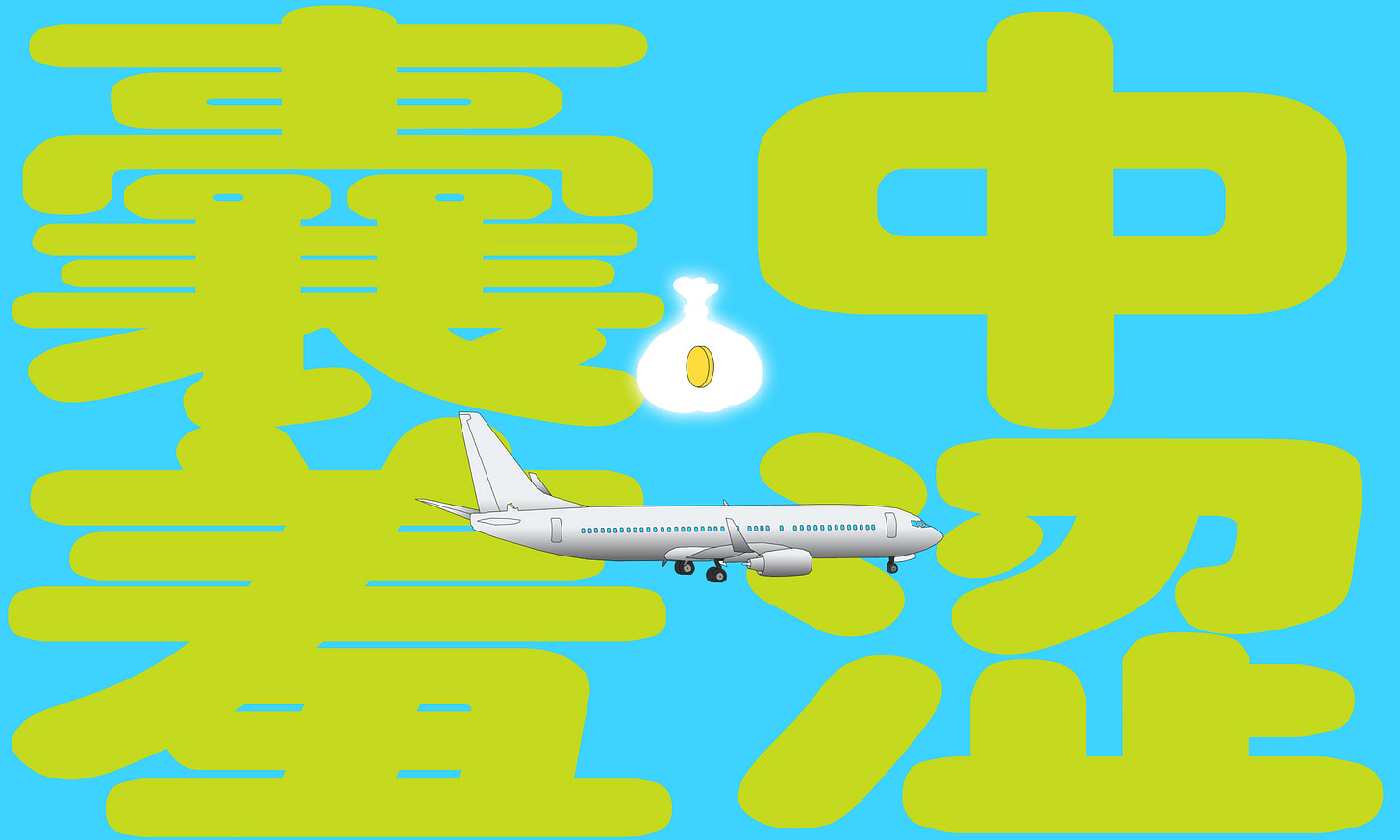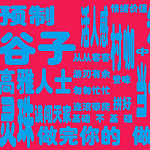Welcome to RealTime Mandarin, a free weekly newsletter that helps you improve your Mandarin in 10 minutes a week.
Subscribe today to get your fluency back, stay informed about China, and communicate with confidence in Chinese — all through immersion in real news.
As China’s Spring Festival travel rush—known as chunyun (春运)—approached, an unexpected phenomenon captured media attention: airfare prices on certain routes plummeted, in some cases by over 70%.
The story went viral on social media with lucky travellers sharing screenshots of their tickets, showing deals as low as 200 yuan, while others compared buying flights to buying stocks and shares:
Recently, social media has been filled with posts from netizens complaining that purchasing airline tickets close to the Spring Festival is like buying stocks — you realise you've bought at the "high point" after you managed to secure it.
最近,社交媒体上不乏网友晒图吐槽临近春节机票如股票,买定离手才发现是“高位接盘”。[2]
Some other unfortunate travellers shared how they felt ripped off for "buying too early," like a resident of Nanjing who booked Nanjing-Sanya tickets earlier in January which cost 1,800 yuan each way.
Ten days before departure, she vented on social media:
"The return tickets are now cheaper than the one-way ticket I bought, so I cancelled and rebooked."
“买两张竟然还有富裕,退票重买了。” [2]
Disgruntled travellers like her have labeled airlines as "travel assassins" (交通刺客)—a term inspired by the "ice cream assassin" (雪糕刺客), which went viral in summer 2022 after an ice cream brand was accused of charging exorbitant prices.
Voted one of the “top internet buzzwords” that year, it now symbolises businesses perceived as ripping off customers, although this newest iteration of the modern phrase has a subtle but important meaning which we discuss in the Member Podcast.
Typically in the weeks leading up to the New Year holidays, as hundreds of millions of people in China scramble to return home, flights are fully booked, priced sky-high, or completely sold out. During last year’s Spring Festival rush, for example, thousands of passengers took "pointless detours" (冤枉路) on obscure routes due to a shortage of affordable direct flights.
However, since 2023, airlines have also started releasing heavily discounted last-minute tickets on certain routes ahead of national holidays to avoid flying with empty seats, as one observer notes:
“I remember just before the 2023 National Day holiday, many people complained on social media that the tickets they purchased in advance were overpriced, as prices suddenly "nosedived" closer to the travel date.
A similar situation occurred before the 2024 May Day holiday, with significant price drops on some routes as the travel date approached.” [3]
记得2023年国庆小长假前夕,就有不少网友在社交媒体上吐槽,称自己提前买的国庆机票买贵了,临近出行时发现票价突然“跳水”;2024年“五一”小长假临近时,部分航线再度出现临近出行时大幅降价的情况。[3]
This is in stark contrast to what it was like before COVID, when price drops of flight tickets in the lead up to holidays were almost impossible. Back then, failing to secure seats early could mean not getting a ticket at all.
According to discussions on social media in the last few weeks, this recent fall in some flight prices is largely due to airlines competing with high-speed rail, which added nearly 2,500km of new track last year. To attract travelers, airlines lower prices on slower-selling routes. The extended eight-day Spring Festival holiday this year also gave people more flexibility, reducing the rush to book early. Additionally, hefty flight cancellation fees, often up to 70%, deter consumers from purchasing tickets until the last minute or not at all, which then further drives price drops.
The primary factor, however, is said to be the overall decline in consumer spending, a trend known as "consumption downgrading" (消费降级). With tighter budgets, many travellers opt for cheaper train journeys, or they hold out for last-minute flight deals.
As a result, airlines, often facing up to a third or even half of their seats unsold near departure on some flights, are forced to slash prices and offer promotions to attract budget-conscious passengers.
From the scarcity in 2023 to the current severe oversupply, coupled with a large number of cash-strapped consumers who have downgraded their consumption, the stage is perfectly set for budget travel during this Spring Festival.
从2023年的紧俏到如今已经严重过剩,加之人们普遍囊中羞涩消费降级,春节穷游的气氛酝酿得相当到位。
This year, for passengers who booked early only to see prices drop, air travel now feels like a gamble during peak periods.
After experiencing these losses, many are becoming hesitant to commit early, a shift that could significantly impact the airline business in the coming years.
So, that’s what we’re exploring this week!
🎧 Member Podcast Preview: This week, we delve into the intriguing evolution of the term "assassin" in Chinese slang, from "travel assassins" (交通刺客) to the infamous "ice cream assassin" (雪糕刺客), and how these terms differ. Plus, we break down expressions for price drops, including “plunge” (跳水) for sudden dips, “sharp decline” (暴跌) for dramatic crashes, “jump-off-the-building prices” (跳楼价) for desperate discounts, and “bone-breaking prices” (骨折价) for massive markdowns. Tune in to learn how and when to use these colourful phrases!
Favourite Five
1. 跳水 tiào shuǐ
plunge, nosedive
春运机票“大跳水”,提前买票亏4000 - Spring Festival airfares nosedived: buying tickets early cost customers 4000 yuan more. [1]
2. 穷游 qióng yóu
budget travel, travelling on a shoestring
春节穷游的气氛酝酿得相当到位 - The stage is perfectly set for budget travel during this Spring Festival. [1]
Related:
哭穷 kū qióng - pretend to be poor, complain about being broke
穷鬼套餐 qióng guǐ tào cān - budget meals, a new consumer trend we noticed last year.
3. 囊中羞涩 náng zhōng xiū sè
short on money, strapped for cash
从2023年的紧俏到如今已经严重过剩,加之人们普遍囊中羞涩消费降级,春节穷游的气氛酝酿得相当到位 - From the scarcity in 2023 to the current severe oversupply, coupled with a large number of cash-strapped consumers who have downgraded their consumption, the stage is perfectly set for budget travel during this Spring Festival. [1]
More: read more about this idiom, and its poetic origins, in this week’s Sinica Phrase of the Week.
4. 交通刺客 jiāo tōng cì kè
“travel assassin”, unexpectedly high travel fees
今年你被“交通刺客”坑了多少钱 - How much were you scammed by "travel assassins" this year? [1]
Related:
背刺 bèi cì – betrayal, backstab
雪糕刺客 xuě gāo cì kè - ice cream assassin, exorbitant ice cream, one of the top internet buzzwords of 2022
5. 此一时彼一时 cǐ yì shí bǐ yì shí
times change, what was true then is not true now
此一时彼一时,当消费者牺牲了金钱的流动性后换来的是降价背刺,失望之情可以理解 - Times change. It’s understandable why consumers feel betrayed, when booking tickets in advance means seeing a steep price drop later. [2]
Consuming the Conversations
Useful words
6. 蹲 dūn
wait, keep watch
河悦说或许明后天还会降,但她也不再蹲了 - He Yue said the prices might drop again in the next day or two, but she's no longer waiting for the right moment. [2]
Note: actually means "squat" but informally means wait, often for deals or opportunities
7. 囧途 jiǒng tú
troubled journey, a trip full of mishaps
200元的机票和归乡路上人在囧途,真是巨大的反差 - There's a world of difference between travelling comfortably with a 200-yuan airfare and on a crowded train that offers a bad travel experience. [1]
Related: 冤枉路 yuān wang lù pointless detour, a complaint of many CNY travellers this time last year.
8. 迁徙 qiān xǐ
migration, large-scale movement
年年春运,全球人类最大规模的迁徙行为 - The Spring Festival is the largest annual human migration in the world. [1]
9. 秒没 miǎo méi
instantly sold out
春节前最难买票的几条线路,火车票均是秒没 - Train tickets on popular routes are instantly sold out before the Spring Festival. [1]
Related:
秒杀 miǎo shā - flash sale, to snap up (like Meituan’s hugely “bulk take-out” 拼好饭 offering)
10. 坚挺 jiān tǐng
firm, stable
过了小年机票仍然坚挺,如上海飞沈阳动辄2000元+,经济舱不打折 - Airlines would not offer discounts even when the Spring Festival is two days away. For example, flights from Shanghai to Shenyang often cost over 2,000 yuan with no discounts on the economy class.
Note: opposite to “bonebreaking price” 打骨折 (see below) which we discuss more in the member podcast.
11. 吐槽 tǔ cáo
to complain
近期,在小红书等社交媒体上,我们总能看到很多网友吐槽机票贵的帖子 - Recently, we frequently see posts from netizens complaining about expensive flight tickets on social media platforms like Xiaohongshu. [2]
12. 赌博 dǔ bó
gambling
旅客什么时候购买机票更便宜就变成了一种赌博 - Choosing the right moment to buy plane tickets at a cheaper price has become a kind of gambling for travellers.
Three-character phrases
13. 骨折票 gǔ zhé piào
"fracture fare", extremely discounted ticket















